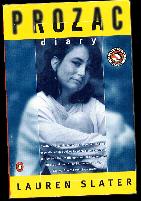 Prozac Diary
Prozac DiaryLauren Slater
 Prozac Diary
Prozac Diary
Lauren Slater
04/03/2003
I just can't relate to Slater's descriptions of depression or being on Prozac. Can our experiences be soooo different? Or is she making hers up? (Or have I made mine up?) Here's a quote from page 89:
"...Prozac... makes you more attentive to the tasks, the tiny things, altogether less transcendent. But perhaps, as Merton might say, the truth is in the tiny things, which is why I have for so long used illness to avoid them. Daily tasks -- washing, laundering, banking, baking -- they force me to my flesh, to the feel of fingers in repetitive movement, to the sloughing and tickings, the burst of a soap bubble, the death of a cell...."
My experience is just the opposite. When I am depressed, I am only capable of the mundane tasks of life, and I long for the transcendent, the creative. When I am on drugs, I am still capable of daily tasks, but also my vision comes back, creativity, ideas. The physical and "spiritual" (for lack of a better word) merge as they are supposed to. In short, everything works.
04/08/2003
This book is driving me crazy. I had such high hopes, after reading Lying. Page 124, describing the effects of a "devil duster" in Kentucky:
"Doors in me had opened. Elegance had entered."
And that's just the problem with this book. It is way too elegant to be believable. It's titled, Prozac Diary, but there is nothing diary-like about it. The pieces all fit together too neatly, conveniently. So many events of her life are metaphors, signs, omens, given way too much weight. She's a poet, in love with the sound of her own voice, more interested in surface beauty than truth, I think. Self-conscious. Trying way too hard to be clever. Michael says that beauty is the opposite of truth. Maybe he's right, if we are only talking about structure, external appearance. But to me, art that rings false is not beautiful; it's annoying. And this book is really annoying me.
Page 125:
"The direct translation of Freud's term superego is 'over I.' Maybe what Freud really meant is not a punishing voice but the bits of the self that manage to rise above the chemicals of illness, the chemicals of cure, and even for a moment take in the world from its own ethereal ledge."
This is what we practice in meditation. Yet that "watcher" is just as chemical as all the other parts of us. I don't think there's anything ethereal about it. It's all physical!
Page 126:
"Choose. That word. That thing separating humans from other life-forms, from beetles, bees, and pigs. Choice was its own sort of funnel with a force. It had a shape in my mouth. So long as I could choose anything at all, I was more than my chemicals, more than my cure."
But... but... but...! the choice is an illusion. It's also a chemical reaction! Ultimately, all our choices are predetermined. I firmly believe that. The only reason we have the illusion of choice is that we don't have enough information. We can't see into the future. We are not all that different from other animals. Bears do what bears do. People do what people do. I sound like that Chevron commercial. Yeesh. Finally, on page 196 she writes:
"Those who are comfortably dependent on Prozac may be, in part, those who have consciously or not embraced a postmodern sensibility, who believe that the ideals of objectivity and truth are outmoded and impossible. I, however, am not one of those people."
Yet! Not one of those people YET. But in a few years she will write, Lying, a thoroughly postmodern book, a book fully acknowledged to be "false" and yet ringing so much truer than this "diary." Somehow she will come to the realization that truth is subjective. I wonder what she thinks of her own book, Prozac Diary, now.